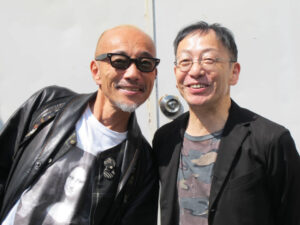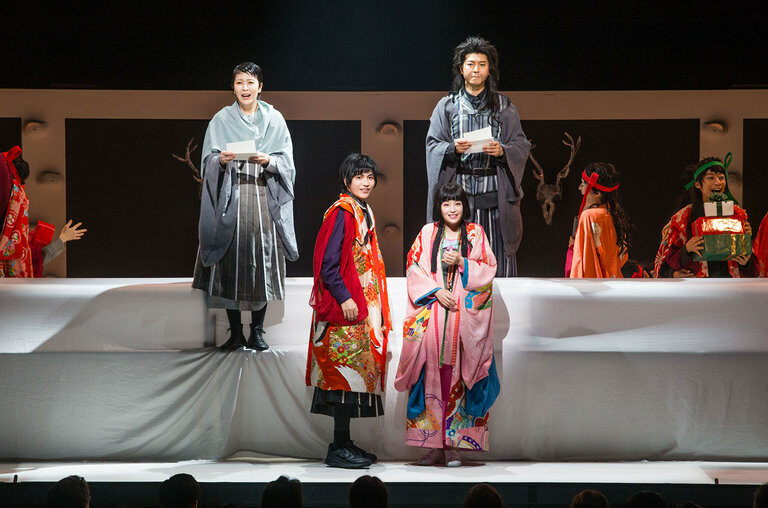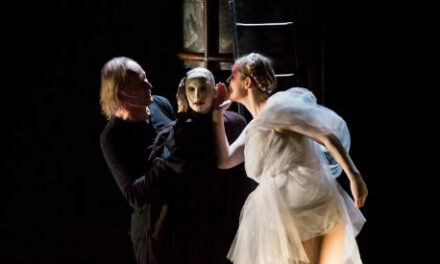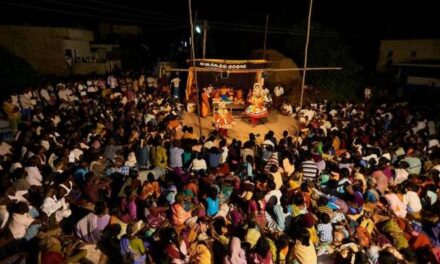The title of Hideki Noda’s new play is Q: A Night At The Kabuki. The “Q” refers to British rock band Queen, while “A Night At The Kabuki” riffs off that band’s hit 1975 album, A Night at the Opera. However, the title’s nod to Japanese culture strongly suggests “Q” is no straightforward spinoff from Bohemian Rhapsody, last year’s Oscar-winning biopic powered by the disc’s best-known song of the same name.
So, is Noda, an internationally acclaimed playwright, director, and actor, about to thrust Queen’s enduringly charismatic vocalist, the late Freddie Mercury, into the kimono-clad world of traditional Japanese theater? Or will Q be some novel kind of jukebox musical?
In a surprising comment about this upcoming work at Ikebukuro’s Tokyo Metropolitan Theatre, where he is artistic director, Noda previously said that Q is “a development of Romeo and Juliet.”
Armed only with this information relating Q to Shakespeare’s early work about a young couple’s tragic love story, I meet Noda, 63, at a studio where he is rehearsing behind closed doors along with the play’s other nine actors.
Joining him for the interview is his contemporary, cast member Naoto Takenaka, an actor, comedian, and film director whose distinctive voice and humorous acting are well-known in Japan.
Noda says Q began with an unexpected proposal from the United States.
“About two years ago, music producer Kaz Utsunomiya, who lives in Los Angeles, asked me to create a play based on Queen’s A Night at the Opera because he had the rights to the album and believed it had a strong theatrical dimension he’d long wanted to see on a stage in Japan,” he says. “I had previously created plays from novels, but never from a music album, so I was a bit puzzled.”
Nonetheless, Noda sent a synopsis to Queen’s production team, which includes the band’s guitarist, Brian May, and got the green light to launch the project.
While keeping details such as his sets under wraps — “so audiences will be surprised when they see them” — Noda says that he has, “of course,” incorporated some of the album’s songs into the play,” pointing out that many of the album’s lyrics lamenting Mercury’s solitude and sadness fit perfectly with the doomed couple’s tale.
As for the practicalities of working long-distance with the Queen team in the U.K., Noda says its members always provided the takes of a song he requested — whether with Mercury playing the piano or full band versions.
“They gave (the play) their full backing and say they can’t wait to see the upcoming premiere,” he says.
Meanwhile, Takenaka says that, while Noda started work on staging Q, it was the first time for him to attend a theater workshop.
“To be honest, I was embarrassing myself,” he says. “When I was a graphic design student in Tokyo, I dreamed about being a film actor, so I occasionally went to theaters to observe the acting.”
“At that time foreign plays were really popular and actors pretending to be foreigners spoke their lines in loud voices facing the audience instead of each other, which made me feel uncomfortable.”
Takenaka joined a theater company after college that only staged Japanese plays. However, as he recalls with a laugh, “When a senior actor asked me whether I understood what my character’s inner thoughts were, I admitted I hadn’t the faintest idea — and I also preferred to act with my back to the auditorium.”
Fortunately, though, he soon moved on to the understated, conversational style of the 1990s “quiet theater,” in which he made his name as an actor and co-producer with its leading dramatist, the award-winning Ryo Iwamatsu.
“One day I heard that Takenaka was interested in working with me, so I contacted him and he joined one of my workshops,” Noda says. His intuition paid off.
“Takenaka gave me an important idea for the last scene during the workshop, though he probably doesn’t remember,” he says, as Takenaka responds with a blank look. “Whether I dreamed it or not, when I saw him improvising a scene of floating in the sea, it gave me confidence to use that image at the end of this play.”

You’re my best friend: Naoto Takenaka (left) was selected for Hideki Noda’s “Q: A Night At The Kabuki,” after joining one of the playwright’s workshops. Photo credit Nobuko Tanaka.
The director says that he had been thinking about writing a new play based on Romeo and Juliet for a long time. Then, when Utsunomiya contacted him, he said the two themes of Queen’s music and the Bard’s tragedy “magically blended” into the new story.
“I thought, ‘What if Romeo and Juliet didn’t die but survived somewhere far away and traveled through time to oversee the lovers now 30 years younger than themselves?’” Noda says. “After all, Romeo and Juliet has lots of scope for being added to or amended.”
Noda has already written his own versions of Richard III, A Midsummer Night’s Dream, Twelfth Night and Much Ado About Nothing.
“(Romeo and Juliet) is a classic tragic love story hinged on miscommunication and it finishes perfectly with those beautiful youths’ deaths,” he says. “Yet, as I got older, I started to doubt that ending. As someone who had lived longer and seen many things, I wanted to write a new version in which Romeo and Juliet survive to become older and wiser.”
Giving form to those ideas in Q, Noda has transferred the location from medieval Verona in Italy to Japan in the late Heian Period (794-1185), with the original’s rival families of Montagues and Capulets becoming the powerful Taira and Minamoto clans who fought each other then.
Reflecting those turbulent times, Noda presents a middle-aged Romeo (Takaya Kamikawa) and Juliet (Takako Matsu) trying to stop the besotted young Romeo (Jun Shison) and Juliet (Suzu Hirose) from killing themselves. In this new version of the story — incorporating a range of tracks by Queen — the innocent teens are able to experience the lives their misguided deaths would have denied them.
“In the second half, the young couple almost mutely watch over what their future would have been as those battles raged. It’s as if their innocent beauty condemns the behavior they witness,” Noda says. “Meanwhile, in the play’s final scene, the mature Juliet — by now in a nunnery, awaiting her imprisoned Romeo — and an old samurai messenger (Takenaka) reflect on their hard lives.”
But, as Noda says, the elderly pair’s reflections also celebrate their lives in a way that, like Queen’s music, touches on genuine human vitality.
Finally, Takenaka takes a moment to lay the praise on Noda.
“Every day I am amazed by his imagination, so I try not to get fixed in my interpretation and remain free to express his visions to the audiences,” he says.
Q: A Night At The Kabuki runs from Oct. 8 to 15 and from Nov. 9 to Dec. 11 at Tokyo Metropolitan Theatre. An English translation service is available on request on certain days. In between these dates, the show will tour to Osaka and Kitakyushu, Fukuoka Prefecture. For more information, visit www.nodamap.com or www.geigeki.jp.
This article was originally published on https://www.japantimes.co.jp. Reposted with permission. Read the original article.
This post was written by the author in their personal capacity.The opinions expressed in this article are the author’s own and do not reflect the view of The Theatre Times, their staff or collaborators.
This post was written by Nobuko Tanaka.
The views expressed here belong to the author and do not necessarily reflect our views and opinions.


















